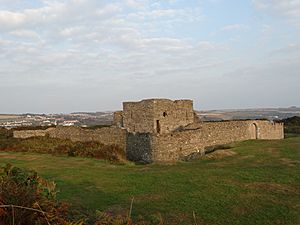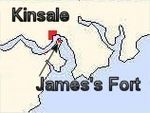James's Fort facts for kids
Quick facts for kids James Fort |
|
|---|---|

Central fortification of James Fort
|
|

Location of James Fort in Kinsale harbour
|
|
| Type | Bastion fort |
| Location | Castlepark peninsula, Kinsale harbour, County Cork, Ireland |
| Built | 1602 |
| Governing body | Office of Public Works |
| Type | Guardianship |
| Reference no. | 525 |
| Description | Star-shaped-fort & blockhouse |
James Fort (which is called Dún Rí Shéamuis in Irish) is an old fort from the early 1600s. It's shaped like a star with five points and is located on the Castlepark peninsula in Kinsale harbour, County Cork, Ireland. This fort was built to protect Kinsale town and its harbour from attacks by sea. Later, when Charles Fort was built across the harbour, James Fort became known as the "old fort." Today, it's a protected National Monument and is open for people to visit. The Office of Public Works looks after it.
Contents
History of James Fort
Building the Fort
Before James Fort was built, there was an older castle called Castle Ny-Parke on the same spot. During the Siege of Kinsale in 1601, Spanish soldiers took over this castle. However, English forces led by Sir Richard Smyth captured it back from the Spanish.
Building of James Fort started in 1602, right after the Siege of Kinsale ended. The fort was named after King James I of England and VI of Scotland. It was designed by Paul Ive to replace the older castle and make the defenses stronger.
The main part of the fort was finished by 1607. It was a stone building with four sides, but it also had special earth walls around it. These walls made it a "star-shaped fort" or a bastion fort. This design helped protect the fort from all directions. A strong building called a blockhouse was also built right by the water. This was like a water battery, guarding the narrowest part of the harbour channel.
Battles and Decline
Just like Charles Fort on the other side of the harbour, James Fort was taken over by Jacobite forces during the Williamite War in Ireland. These were people who supported King James II. But in 1690, Williamite forces, who supported King William III, captured the fort. This happened after some gunpowder stored inside exploded and damaged the fort.
While Charles Fort stayed an active military base until the early 1900s, James Fort was used less and less after the 1700s. By the 1800s, maps and writings described it as a ruin.
James Fort Today
Archaeology and Protection
In the late 1900s and early 2000s, archaeologists dug up parts of James Fort to learn more about its past. One important survey was done in 1998 by Dúchas, which was Ireland's heritage service at the time.
The fort is officially listed as a National Monument (number 525). This means the Irish government protects it. In 2016, An Taisce (the National Trust for Ireland) said the fort was "at risk." They noted that while some work had been done to preserve it, a long-term plan was needed to stop it from getting worse.
Visiting the Fort
Today, James Fort is open to everyone. It's a popular place for tourists to visit and also a nice park for people who live nearby. Many people enjoy walking and running around the fort site.
Images for kids
 | Laphonza Butler |
 | Daisy Bates |
 | Elizabeth Piper Ensley |


